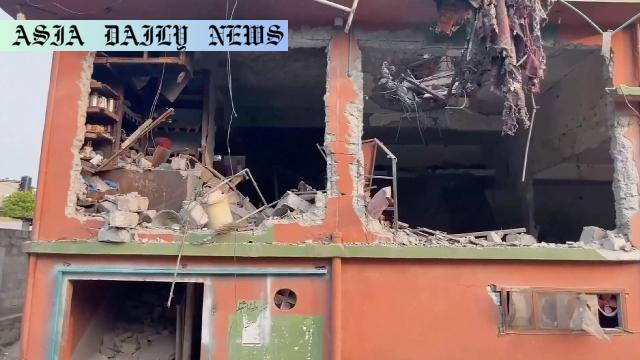Tensions: Pakistani PM vows retaliation as India strikes terrorist infrastructure, drawing global calls for de-escalation.
- Tensions between India and Pakistan escalate after Indian military strikes.
- Pakistani PM vows retaliation; world leaders urge dialogue.
- 26 victims’ families demand a stronger anti-terrorism response.

Rising Tensions Amid Indo-Pak Conflict
The escalating conflict between India and Pakistan has become a focal point of global concern. Trouble brewed with last month’s terror attack in India-controlled Kashmir, leading to the deaths of 26 individuals, primarily Indian tourists. India’s immediate response, targeting what it labeled as ‘terrorist infrastructure,’ included a series of strikes on Pakistan and Pakistan-administered Kashmir. Following these strikes, reports emerged of significant casualties, with the Pakistani government reporting 31 deaths.
Pakistani Prime Minister Shehbaz Sharif addressed the nation with a strong and retaliatory tone, promising justice for the lives lost. “I will avenge each drop of the blood of these martyrs,” Sharif declared, signaling an open challenge to India and firm resistance to its policies. This rhetoric has further strained already fragile relations between the nations, setting the stage for potential further military clashes.
International Leaders Call for Peace
As the tension surges, the international community has stepped in, urging restraint and encouraging dialogue. U.S. President Donald Trump expressed deep concern, emphasizing the need for immediate peace efforts to prevent further casualties. Similarly, British Prime Minister Keir Starmer highlighted the concern within the UK, given its significant South Asian diaspora. Leaders from both the United States and the United Kingdom have called for steps toward de-escalation while advocating for the safety of civilians.
The humanitarian crisis prompted by these tensions has not been ignored. Calls for diplomacy and non-violence were echoed across international platforms, with the global community insisting on a dialogue-centric resolution. This underscores the importance of avoiding civilian harm in the crossfire of intergovernmental disputes.
The Widow’s Wrenching Testimony
Adding a human dimension to the crisis is the story of Aishanya Dwivedi, who lost her husband in the April attack in India-controlled Kashmir. Her harrowing narrative, marked by the brutal targeting of individuals based on their religion, paints a grim picture of extremist ideologies fueling violence. Her husband’s death — before her very eyes — is a powerful reminder of the personal toll such geopolitical disputes extract from ordinary lives.
According to Aishanya, her devastating experience underscores the urgency of government accountability and a stronger stance against terrorism. She details the aftermath of the violence, her survival, and the emotional burden she now carries. Her voice resonates with many who seek justice and demand security from their leaders.
The Path Ahead: Preventing Escalation
The path forward appears fraught with challenges. With two nuclear-armed nations entangled in hostility, the risks of further escalation are exceedingly high. This makes de-escalatory steps not only critical but urgent. Experts emphasize the need for mediated talks, potentially involving neutral third-party entities, to bridge the gap and create a roadmap for peace. Transparency, confidence-building measures, and reducing military posturing are key strategies that could avert a larger-scale conflict.
Equally important is the global community’s role in ensuring that Indo-Pak dialogues remain constructive. Any delay or sense of inertia in resolving this issue could lead to unforeseeable consequences, many argue. Domestic political pressures in each country are also factors that could significantly influence decision-making.
Conclusion: A Call for Immediate Dialogue
The current situation between India and Pakistan demands more than just diplomatic interventions; it requires a widespread intent for peace and humanitarian considerations. As both governments wrestle with national sentiments and regional power dynamics, civilian safety must remain at the forefront of any actions taken. History has shown that conflicts left unresolved often spiral into multi-headed crises.
The stories of the victims, like Aishanya and her late husband, should serve as stark reminders of the human cost of such disputes. Ultimately, rising above the cycle of retaliation and focusing on diplomatic resolution will not only prevent further loss of lives but also pave the way for a more peaceful and prosperous subcontinent.



Commentary
Understanding the Gravity of the Situation
The deepening hostility between India and Pakistan reflects decades of unresolved political, territorial, and ideological conflicts. The recent military strikes by India against alleged terrorist infrastructure in Pakistan, coupled with Pakistan’s retaliatory rhetoric, mark yet another grim chapter in this ongoing struggle. These events underscore the fragility of regional stability and the significant potential for escalation.
The Role of International Stakeholders
It is heartening to see global leaders expressing concern and urging for peace, but one cannot ignore the critical question: Are these efforts enough? The statements by leaders such as U.S. President Donald Trump and British Prime Minister Keir Starmer signal international solidarity, yet the absence of concrete proposals for mediation highlights a gap in meaningful intervention. Perhaps the global community needs to adopt a more proactive approach to prevent such conflicts from spiraling into catastrophic proportions.
The Human Element: Stories That Serve as Stark Reminders
Amid the political rhetoric and strategic maneuvering, it is critical to remember the human impact of such conflicts. The story of Aishanya Dwivedi and her late husband unflinchingly illustrates the extent of personal loss caused by terrorism. These lived experiences emphasize the urgency of resolving such disputes and ensuring the protection of innocent civilians caught in the crossfire.
Looking Toward the Future
Moving forward, all stakeholders must prioritize dialogue and de-escalation. Whether through multilateral talks or incentivized bilateral engagements, the focus must shift toward sustainable peace. Both India and Pakistan stand to lose immeasurably in prolonged hostility, underscoring the importance of international mediation and domestic political determination in fostering reconciliation.